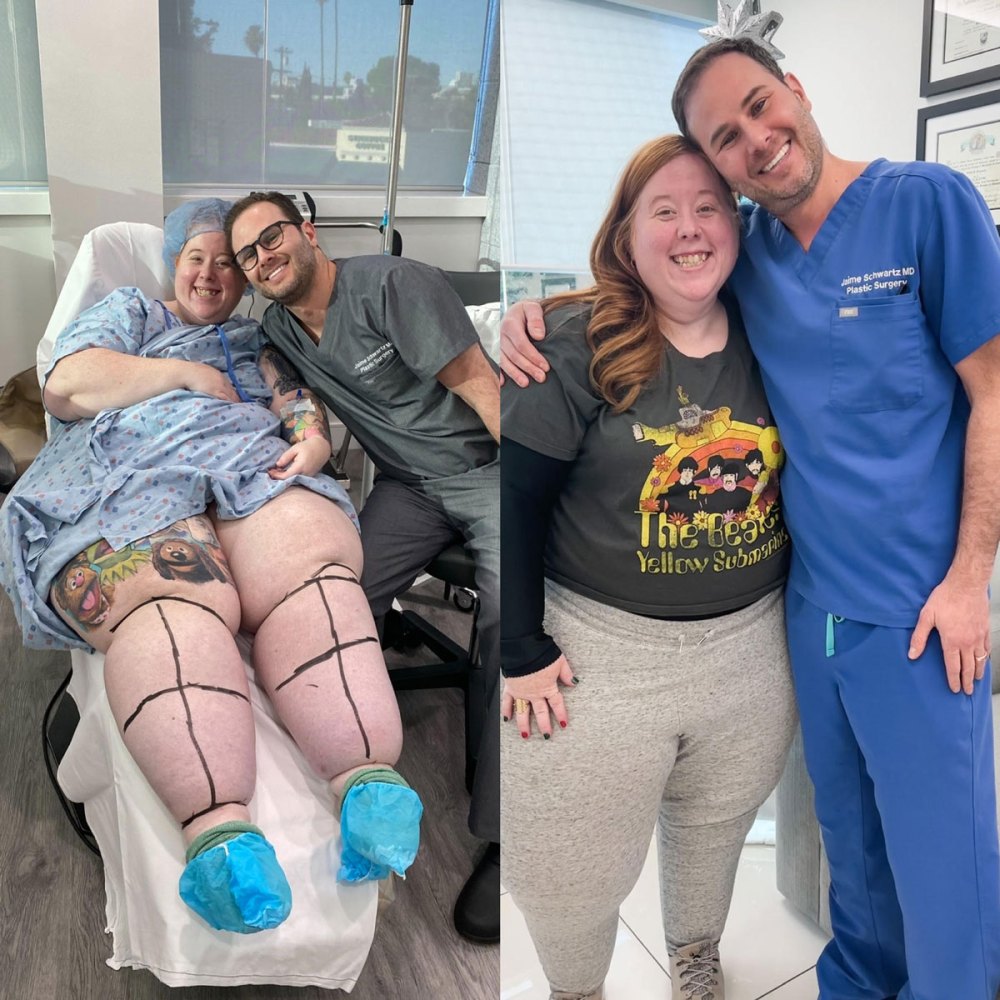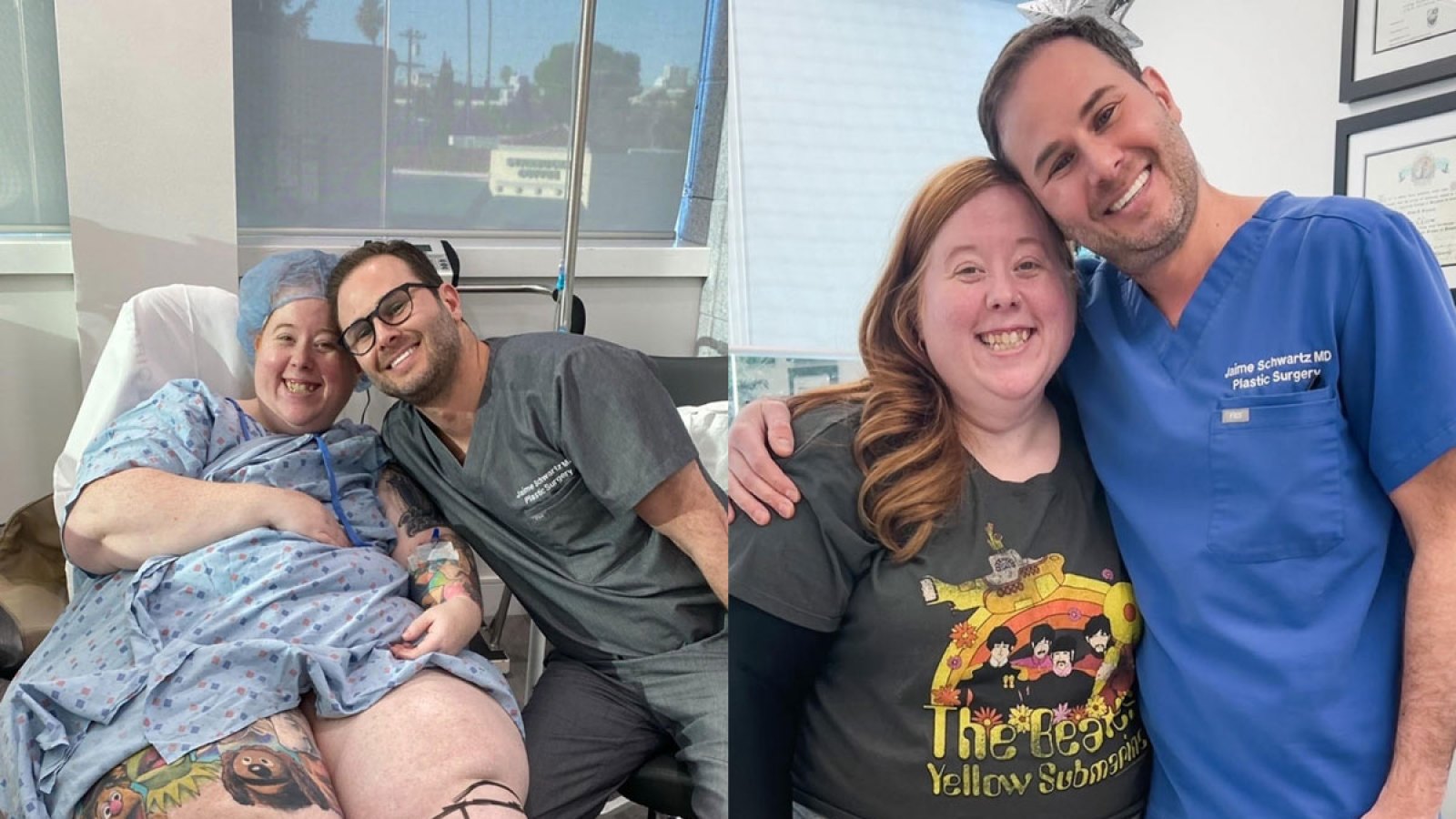Imagine having a health condition that makes it hard to lose weight no matter how much you diet and exercise. Now picture going from doctor to doctor searching for answers only to be told you need to eat less and work out more. For most of her life, this was Cara Cruz’s reality. She was diagnosed with lymphedema after a leg injury, but it would be another eight long years, until a physical therapist would tell her she might have a connective tissue disease called lipedema.
“When I was an infant everyone passed me around, so they could squeeze my thighs,” she says. The 40-year-old grew up right outside of Pittsburgh in a small town where everyone saw every move she made. “I was always the chubbier kid in my classes and when I was around six years old, my dad, who was in the Marines, used to wake me up in the middle of the night for early morning walks and put me on various diets. It just baffles me that all these years later, the medical community is still fat-phobic and hasn’t figured out a way to diagnose people properly.”
Once Cruz met Dr. Jaime Schwartz in 2019, she says she finally got the clarity and guidance she needed. Dr. Schwartz, a diplomate of the American Board of Plastic Surgery and a respected member of the American Society of Plastic Surgeons (ASPS), is the founder of Total Lipedema Care and developed the groundbreaking technique called Manual Lipedema Extraction™ otherwise known as MLE™. “This technique was developed as a more gentle and thorough surgical procedure that has amazing short and long-term outcomes for women suffering with lipedema,” he says.
After meeting Cruz, he immediately agreed she was a “poster child” for lipedema, given the severity of her condition, which affected her entire midsection, arms, and legs known as centralized Lipedema. “Within seconds of meeting Dr. Schwartz, I went from feeling invisible within the medical world to having a treatment plan.”
Due to the severity of her disease, Cruz had seven surgeries with Dr. Schwartz, each targeting different areas of her body affected by lipedema. “The surgeries have been transformative, not just in terms of my physical health, but also in my confidence and outlook on life.”
But Cruz isn’t one of hundreds of women who have a story like this to tell. Dr. Schwartz says she’s one of millions.
“When I talk to patients, they sob as they tell me what they’ve been through. For years, these women have been teased, fat-shamed, and in some cases, had significant others leave them all due to their size. When doctors see a larger person, many don’t see a patient who is losing mobility or question why someone’s fat might be painful to the touch. In short, they don’t see these women as patients with a connective tissue disease, they just see people as a number on a scale.” Dr. Schwartz adds, “what’s made things worse is that rather than even understanding or diagnosing lipedema, they recommend gastric bypass or weight loss drugs like Pentermine or Ozempic which do not work and have their own negative side effects.”
Frustrated by the lack of education around lipedema, Dr. Schwartz has dedicated his career to informing the public and treating patients who come to see him from all over the world. “Lipedema is a genetic condition, primarily affecting individuals who identify as female. While it’s more commonly observed in women, there have been a few documented cases of males with lipedema. We have a handful of male patients from regions like the Middle East, such as the cases encountered in our Dubai office. Lipedema is not dominant, meaning that if one person within a family has it, it does not necessarily imply that all family members will develop the condition. Moreover, it may not be limited to direct lineage, as aunts, grandmothers, or other relatives might also be affected.”
A leading expert in the field, Dr. Schwartz co-wrote the U.S. Standard of Care Guidelines for the disease. “This was a big breakthrough and the culmination of years of effort. Our goal is that these guidelines will serve as proof of lipedema as a medical condition that insurance companies and medical professionals can no longer dismiss its existence.”
Dr. Schwartz also highlights the role hormones play in the development and progression of lipedema is quite significant.
“What I want people to know is that lipedema tends to progress during puberty, pregnancy, when starting hormonal birth control pills, and during menopause. And this connective tissue disorder often coincides with flexibility. Many people with lipedema, particularly in their younger years, were athletes, gymnasts, or softball players – roles that demanded significant bending and flexibility. This flexibility, however, often leads to early joint surgeries, which can trigger lipedema symptoms.”
For Cruz, it’s a roadmap she wishes she had sooner in life. “There were so many times throughout my life that if doctors had just paid attention to me beyond the fact that I was chubby or fat, I could have gotten help before I became such a late-stage patient.”

With 104,000 followers on social media, she understands the importance of sharing her story, not just for herself but for others who may be facing similar struggles. “Dr. Schwartz changed my life. I’m pain free. I didn’t know I could ever live like this.”
Whether she’s @palegingerpear on Instagram, or talking with someone in-person, Cruz says her message is clear: “Don’t accept the ‘just lose weight’ answer if you know something is wrong with your body. Fight for a proper diagnosis and seek out the support and care you deserve.”
Article written by Tom White
Us Weekly partners with external contributors. All contributor content is reviewed by the Us Weekly editorial staff.

